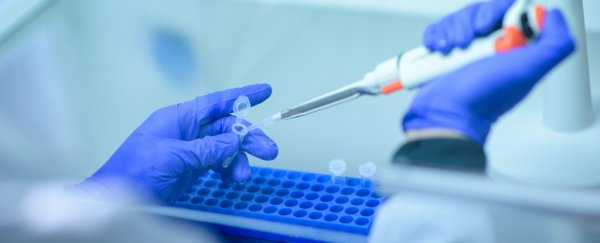Testing of one of the world's leading COVID-19 vaccine candidates has been interrupted after safety concerns have put the latest clinical trial phase on hold.
The test vaccine, jointly developed by pharmaceutical company AstraZeneca and scientists at the University of Oxford, was considered a frontrunner in the global race to find a safe, effective immunisation that protects against SARS-CoV-2 infection.
However, according to health news site STAT, which broke the story earlier today, the vaccine's Phase 3 trial was put on hold after a "suspected serious adverse reaction" to the drug in one participant in the UK.
The individual in question is expected to recover, but it remains unclear just how this incident will affect the Oxford vaccine's future development. Shares in AstraZeneca immediately fell as news of the setback spread, but the ripple-on effects could extend much further.
According to STAT's report, the trial suspension isn't just impacting AstraZeneca's vaccine trials, but may also affect clinical trials being conducted by other vaccine manufacturers.
While the vaccine developers haven't revealed the details of the potential adverse reaction, the company has downplayed fears, highlighting that trial suspension is a standard process, and can be triggered by a single medical event.
"This is a routine action which has to happen whenever there is a potentially unexplained illness in one of the trials, while it is investigated, ensuring we maintain the integrity of the trials," AstraZeneca explained in a statement given to media.
"In large trials illnesses will happen by chance but must be independently reviewed to check this carefully."
As many as 50,000 people were reportedly taking part in trials for the vaccine candidate, which is just one of about 160 such experimental drugs currently being tested to prevent coronavirus infection.
Amidst that burgeoning field, however, the Oxford vaccine was part of an exclusive group of just nine drugs that had progressed to the Phase 3 testing stage – the biggest and final testing phase, often involving tens of thousands of different people, and occurring before final approval of a drug by health authorities.
These sorts of hold-ups in Phase 3 trials are very common, experts say, when unforeseen medical events, which may or may not be related to the drug being tested, inadvertently interrupt the trial.
"It would happen in every single clinical trial. It is extremely common. There is nearly always someone who dies or has a stroke during a clinical trial," biostatistician Adrian Esterman from the University of South Australia told The Sydney Morning Herald.
"It always works like this. It's just that most people normally don't get to see it. People should not be too despondent… Research does not work on a linear path. There are hiccups, there are hurdles, and sometimes we have to backtrack."
Science working as intended
While it may be disappointing to hear that a promising COVID-19 vaccine is experiencing hold-ups – let alone potentially serious ones – it's also worth recognising the fact that this is exactly how clinical trials are supposed to function, with a robust, multi-stage system of checks and balances that scientifically confirm whether drugs are safe and effective prior to release.
Setbacks like this are exactly the reason why vaccines and medical drugs more generally should never be rushed through testing. Despite the risks, in the face of the pandemic numerous countries have recently appeared to be doing just that, with Russia and China expediting their own trials.
Even in the US the same sort of thing has been officially contemplated, with President Trump controversially urging the release of a coronavirus vaccine in the lead-up to the US election in November.
Against that sort of pressure, the CEOs of nine leading pharmaceutical companies developing COVID-19 vaccines – including AstraZeneca – pledged this week to "uphold the integrity of the scientific process" and not release any of their test vaccines until the drugs had passed Phase 3 testing.
It's an admirable, united stance, emphasising the importance of standing by existing testing systems, which are designed to deliver safe, working drugs, and only after they've been rigorously evaluated.
